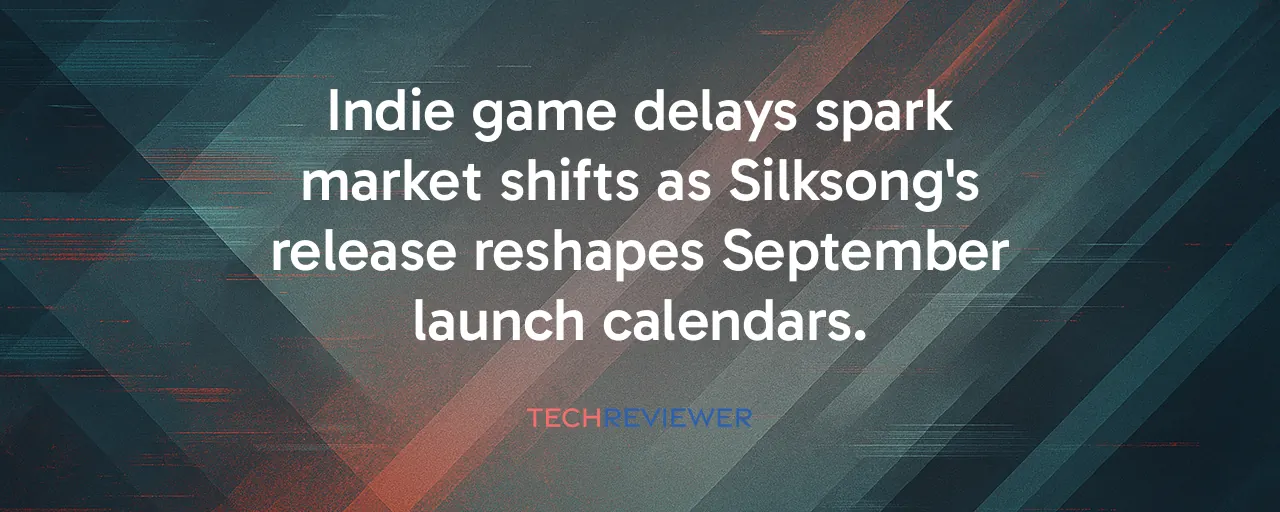The Silksong Effect
When Team Cherry announced Hollow Knight: Silksong's release for September 4, 2025, the indie gaming world felt the ground shift. Smaller studios, already juggling tight budgets and packed schedules, scrambled to adjust. Within hours, several developers pushed back their own launches, citing one overwhelming reason: nobody wants to compete with a juggernaut boasting 1.8 million Steam wishlists. This moment exposes a deeper truth about today's indie game market, where a single blockbuster can reshape entire release calendars.
The ripple effect caught many off guard. Studios like Aeternum Game Studios and Panik Arcade publicly delayed their titles, pointing to Steam's unforgiving visibility algorithms and mid-week traffic dips. With over 1,200 PC games slated for September, standing out feels like shouting into a void. Silksong's launch demonstrates how platform dynamics dictate who gets seen and who fades away.
Navigating Steam's Algorithm Maze
Steam's discovery system is a double-edged sword for indie developers. With 150 million monthly active users, the platform offers massive reach, but its algorithms reward early momentum. Games with high wishlist counts, like Silksong, dominate front-page slots, while newcomers struggle to break through. Data from marketing analysts shows titles need at least 7,000 wishlists to trigger meaningful algorithmic boosts, a tough bar for small studios with limited marketing muscle.
Mid-week launches, such as Silksong's Thursday slot, add another layer of complexity. Steam traffic drops 12-15 percent from Tuesday to Thursday compared to weekends, meaning indies launching alongside a major title risk getting buried. Aeternum Game Studios, for example, moved Aeterna Lucis to 2026, stating the game deserved better visibility. Panik Arcade similarly shifted Pit Fighter to late September, citing analytics showing 50-60 percent lower click-through rates during high-profile launches.
Lessons From the Trenches
The Silksong effect offers hard-won lessons for indie studios. First, flexibility is critical. Aeternum's delay to 2026 aimed to avoid Silksong and was a strategic bet on a quieter window to maximize exposure. Panik Arcade's shorter delay to late September shows a different tactic, riding the tail of Silksong's hype to capture spillover attention. Both moves highlight the need for data-driven scheduling, with studios leaning on internal dashboards to track wishlist velocity and traffic patterns.
Another lesson is the power of collaboration. Smaller studios are exploring co-marketing bundles to pool wishlists and boost visibility. Events like Steam Next Fest, where pre-launch demos drive algorithmic momentum, are becoming lifelines. However, these strategies demand resources many micro-studios lack, raising questions about fairness in a market where attention is a zero-sum game.
Balancing Hype and Fairness
Players stand to gain from a less cluttered September, with Silksong's polished metroidvania gameplay, praised for 60 fps on handheld devices, taking center stage. But delayed niche titles mean some fans wait longer for their favorites. There's also a risk of hype backfiring if Silksong doesn't meet sky-high expectations set by its predecessor's sleeper-hit success in 2017.
Steam's dominance sparks concerns. Marketing analysts and developers argue the platform's opaque algorithms create an uneven playing field, favoring proven hits over fresh voices. Some studios resort to risky tactics like artificial wishlist boosts, which erode trust. Regulators in regions like Europe are starting to eye storefront market power, questioning whether ranking criteria disadvantage smaller vendors.
A New Playbook for Indies
Silksong's launch is a wake-up call for indie studios to rethink strategy. Cross-platform releases, while demanding, spread risk across Switch, PlayStation, and Xbox audiences. Live festivals and demos can build early buzz, provided budgets allow. Smaller teams might look to open-source analytics tools or cross-promo widgets to funnel attention from earlier titles, leveling the playing field.
The bigger picture is clear: Steam's algorithms and Silksong's gravitational pull are forcing indies to adapt fast. Through smarter scheduling, creative marketing, or collective action, studios can find ways to shine in a crowded market. As one developer put it, playing the long game is essential to thriving beyond the Silksong surge.
